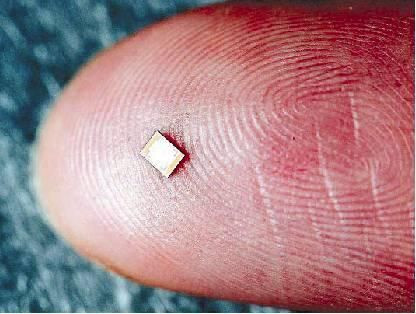Researchers Develop Microchip Implant To Help With Weight Loss

Helping overweight patients drop pounds is an ongoing battle for doctors. With over a third of Americans considered obese -- and either unwilling or unable to lose weight -- medical scientists and experts are after the holy grail: an easy, inexpensive solution to weight loss.
And they may be getting close: it was recently announced thatrResearchers from the United Kingdom developed a microchip that could be implanted on a nerve to curb appetite.
"This is a really small microchip and on this chip we've got the intelligence which can actually model the neural signals responsible for appetite control," Chris Toumazou, professor at Imperial College London and one of the inventors of the chip, told the BBC.
Measuring only several millimeters wide, the chip (called an "intelligent implantable modulator") will attach to the vagus nerve in the abdominal cavity using cuff electrodes. The vagus nerve allows you to speak and swallow, reduces heart rate, and monitors digestive processes, along with other responsibilities. Importantly, it's also the primary communicator between the brain and digestive tract.
The researchers are claiming that the chip would be a more efficient -- and cheaper -- option than weight-loss surgery for severely overweight individuals.
The chip wasn't designed from scratch. The research team already had developed a similar technology called MIMATE, which is currently being tested to help children with cerebral palsy and epileptic seizures. MIMATE reads chemical signals sent from the brain to an affected organ, such as a stroke-affected hand, and then sends stimulating impulses to the organ. The goal is to help patients gain dexterity and hand/eye coordination.
The main difference between MIMATE and the weight loss chip (the intelligent implantable modulator) is that the newer device it doesn't send stimulating impulses. The weight loss chip would only read the reoccurring electrical and chemical signals of appetite produced in the nerve. It then submits readings and sends a signal to the brain telling it to suppress eating.
"As a result of monitoring these signals we can stimulate the brain to counter whatever we monitor," Toumazou said. "It will be control of appetite rather than saying don't eat completely. So maybe instead of eating fast you'll eat a lot slower."
In addition to communicating with the brain, the chip would also signal the same message ("resist the urge to eat!") to the intestines. In this case, it may also eliminate the adjustable gastric band surgery method, as well.
However, a lot of work needs to be done before the chip comes to market. The researchers behind the product state that animal testing will begin soon, followed by three years of clinical trials. The European Research Council has committed the equivalent of $9 million towards this project.



























